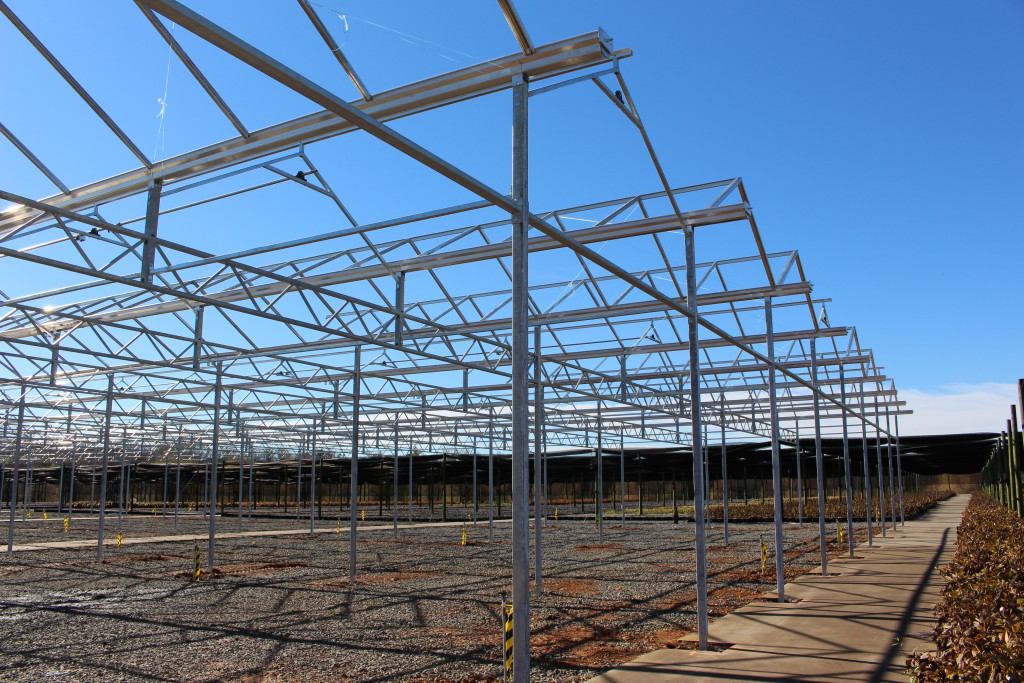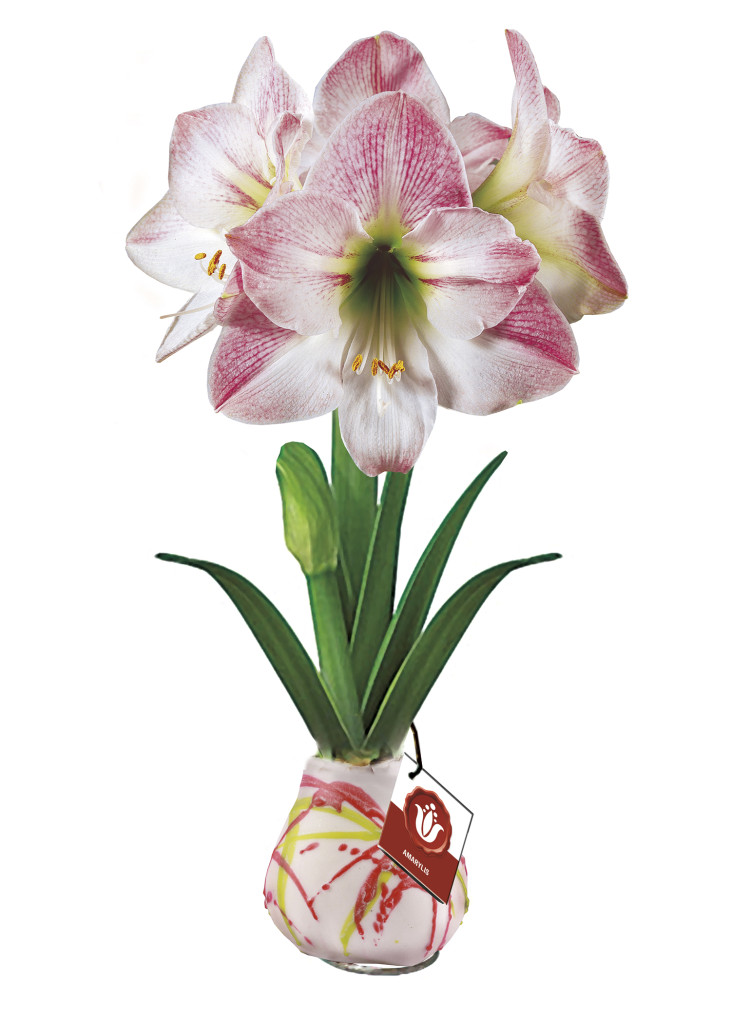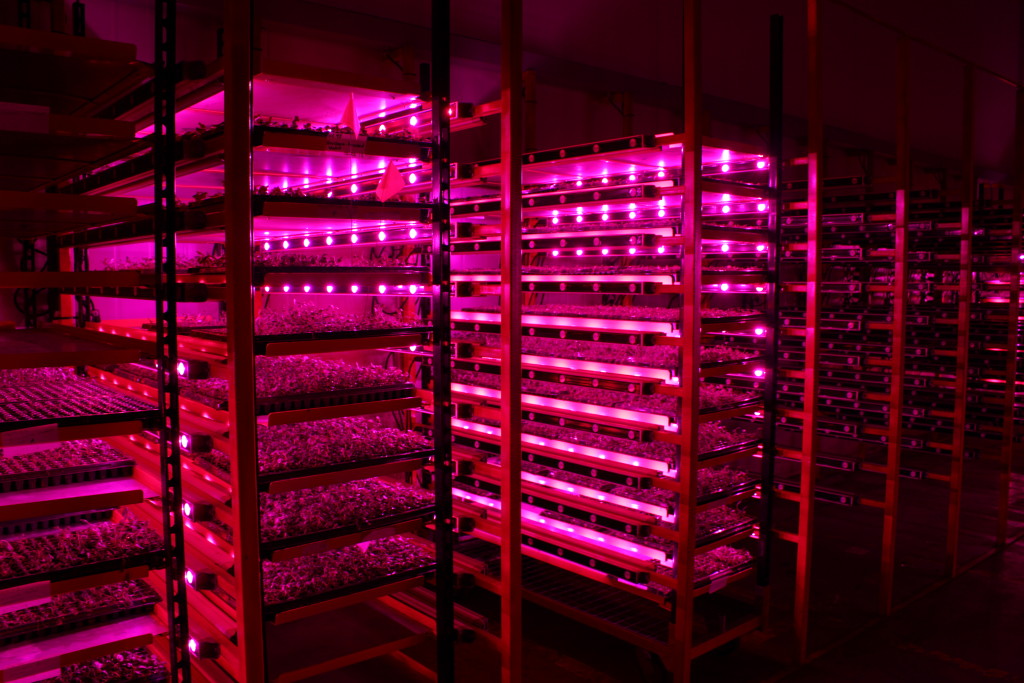
COVER STORY — The Comeback Kids
When Jerry Van Hoven purchased Battlefield Farms in Rapidan, Virginia, in 1990, the entire operation spanned about 6 acres. Today, two of his sons, Anthony and Bobby, own a majority of the company, which now totals 65 acres of growing space.
Battlefield Farms has evolved immensely over the past 25 years and continues to grow and expand its offerings despite many hurdles. Lessons had to be learned along the way, but those lessons have propelled Battlefield Farms into one of the most technologically advanced and diversified greenhouse operations in the country.
I sat down with Anthony, president, last month to learn more about Battlefield Farms’ most recent developments. He’s had an almost lifelong history with the company that has come full circle.
“I was 10 years old when we moved here,” he says. “I was always involved in it.”
But when he went off to college, he had no intention of sticking with the family business. “I went to school for business management, and I wanted to be in high-risk business,” he shares.
However, coincidentally, the production manager position opened up right around the same time Anthony graduated. “It was the best opportunity for me to a) get into high-risk business and b) manage people.”
He may not have predicted he’d still be at Battlefield Farms today, but Anthony enjoyed the challenges that came along with running production. And four years later, he became general manager.
Through those years, the company expanded rapidly. Anthony’s brother, Bobby, was also greatly involved and was managing things on the shipping and logistics side. Bobby eventually became more heavily involved in sales as well
By 2011, Anthony was managing operations and finances while Bobby oversaw logistics, sales and construction. That next year, the two brothers purchased Battlefield Farms from their father.
AN EARLY LESSON LEARNED
It’s a common saying, but it rings very true in the greenhouse industry: Do not put all your eggs in one basket.
When Anthony and Bobby took over the operation, their two biggest customers were Wal-Mart and Lowe’s. That very first spring, their relationship with Wal-Mart came to an end.
“We did around $6 million in sales with them,” Anthony says.
And if that wasn’t detrimental enough, the very next day, Lowe’s took away one of Battlefield’s districts. “So there’s another $6 million,” he adds. “In less than 24 hours, we lost $12 million in sales. We lost 30 percent, and that hurt.”
Those early losses forced them tochange everything, says Anthony. They had to let go of almost 30 percent of their labor, in production and the front office. From top to bottom, Battlefield Farms went through a complete restructure.
Diversification was the next step. At the time, they had started dabbling in perennial liners and knew they wanted to diversify. This newfound situation solidified that for them — so they grew their perennial liners program.
“We had all these coolers for the bulbs and bare roots, so we do these liners and we vernalize the plugs,” Anthony says.
“Typically perennial farms plant all their stuff out in the field in the fall, and they sell it in spring. They get one turn. Well now they sell their first turn and then buy liners from us, plant it up, and in four to six weeks, they’ve got another product ready. They’re getting two turns out of their place by buying our liners.”
Another step to diversification was bulbs. “We got back into Easter lilies and tulips because no one was really doing that for Lowe’s,” Anthony says.
The company re-introduced a bulb program (they had grown bulbs in the past but had since dropped the program), and they did it well. Battlefield created a very strong program, which they now sell to Lowe’s, grocery chains and even some other growers who are unable to grow bulbs. Today, they are leaders in Easter bulbs.
AN INNOVATIVE PARTNERSHIP
Battlefield’s partnership with Lowe’s has since grown, and today they reach stores from western Pennsylvania through northern New York. And they work hard to preserve that relationship.
“We always want to be the best at quality and service,” says Anthony. “Quality is obviously our product. And service is anything that helps make their jobs as easy as possible. That’s for all our customers; it doesn’t matter if it’s Lowe’s or the grocery stores or other growers.”
One unique aspect of Battlefield’s relationship with Lowe’s is that “Lowe’s expects us to come to them with new products and new ideas each year.
“We try to bring them 10 to 15 new ideas a year,” Anthony says. “It doesn’t have to be a new plant. It can be a different kind of packaging or marketing.”
The purpose of this yearly presentation of ideas is to show their biggest customer that they are dedicated to innovation. “We strongly believe if you’re not ahead of the curve, you’re behind the curve,” he says. “We know we have to be at the forefront.”
One example of an idea that came into fruition is Battlefield Farms’ waxed amaryllis program. Last year, they introduced it and this year it doubled. It was a tremendous hit at Lowe’s.
“It’s a waxed amaryllis bulb that we get in from Holland,” Anthony says. “You don’t have to water it. You just set it out and it blooms. It’ll look nice for two months, and you don’t have to touch it. People put it on their desks, as a centerpiece on tables. They just look awesome.”
INVESTING IN AN EFFICIENT OPERATION
Battlefield Farms doesn’t want to only be at the forefront in regard to product offering. Their facility is just as significant as their product. Prior to selling the operation to his sons, Jerry Van Hoven made sure to invest in structures and equipment.
“All of our greenhouses have booms in them,” shares Anthony. “And about 8 acres have ebb and flood. We have a Priva system throughout the whole greenhouse for temperature and humidity control.”
Seven years ago, the company purchased two wood chip boilers to get off natural gas and propane.
“We burn only clean chips. That way we get more usage out of the wood,” Anthony says. “There’s very little waste, practically none. It burns cleaner, it’s better for the boilers, and so the maintenance is much easier compared to burning pallets or rubber.”
Another example of improved efficiencies is Battlefield Farms’ four retention ponds.
“The first one was built in the late 90s, and as we grew, we added three more retention ponds,” says Anthony. “All the water that falls in the greenhouse, all the water that we use in the facility, and all the water that falls in the outdoor field, everything goes back to the retention ponds. We filter it and reuse it.”
All that collected water leads to substantial cost savings. Anthony says an inch of rainfall equals more than a million gallons of water!
“We try to put as much technology as we can to help us be more efficient. It is a lot of upfront costs, but in the end you’re working on efficiencies.”
The reality is growers are not getting more money for their product, certainly not enough to balance price increases in cost of living, labor, shipping, plastic, etc.
“The only way to make money,” Anthony says, “is to become more efficient in your own facility. You have to find ways to cut costs and be more productive. Otherwise, you’re not going to make it, which we’ve seen plenty of over the last few years.”
Battlefield Farms is currently adding 3 acres of covered greenhouse to the operation. Expansion is nothing new to the company, but this is the first addition they’ve made since Anthony and Bobby have taken over the business.
“We want to keep growing,” Anthony says, “but we want to do it intelligently. Hence the reason we didn’t expand for the first three and a half years.”
LOOKING FORWARD
All Battlefield Farms’ hurdles and investments have led to many opportunities. One recent opportunity that they couldn’t pass up was the chance to grow finished perennials for Lowe’s, starting in 2017.
“This will be on top of the finished annuals and bulbs,” Anthony says.
This won’t be the first time Battlefield grows finished perennials, but it will be on a much larger scale. “We had a finished perennial program with Wal-Mart, but it was only a quart program.”
He says he is not scared at all and is certain they will do a good job. “The thing is we grow over 700 varieties of rooted perennial plugs now. Pretty much everything they want, we grow already. We just haven’t finished them in the finished container.”
Another new development is that Battlefield Farms has been trialing LED lights for tissue culture for the past year and a half. This year, they decided to make a big investment and build a whole cooler with LED lights.
“We were having over 30 percent losses in certain varieties, like echinacea,” shares Anthony. “We were trialing under the LED lights and controlling the temperature, and the losses dropped to 7 or 8 percent.”
He says this new process can help in other areas as well. “We have a hard time with pansies in the fall because of the heat. Well, now we can do it in the cooler underneath the lights until they’re ready to transplant.
“We’re doing all of our plugs through the cooler this year, and this is the best our perennial liners have ever looked.”
BECOMING MPS CERTIFIED
Five years ago, Battlefield Farms began the process of becoming certified through MPS (www. my-mps.com). Owners Anthony and Bobby Van Hoven noticed a huge push toward certification occurring in Europe and knew it was going to make its way to the United States.
“We believed at the time that we had a very efficient, clean greenhouse,” Anthony says.
They had already implemented some efficient processes and had installed biomass boilers and retention ponds by then. The biggest push, Anthony says, was on the chemical side.
“MPS came here and we started off with a C rating because some of the chemicals were just really hard,” he shares. “They don’t do just chemicals though. They go over power usage and electricity; they check everything from A to Z.”
MPS comes back and performs an audit every year, and finally this past spring, Battlefield Farms earned its first A rating!
“What I really liked about the MPS certification is it made us really evaluate where we’re spending money and where we could make improvements,” Anthony says. “It’s definitely helped us, not only because you want to improve and get an A, but it also helped us become a better company in the use of chemicals and energy, and being better growers.”
Battlefield has presented their MPS certification to their biggest customer, Lowe’s, and explained their reasoning behind it. “We said everybody should get on this, because then nobody can protest at your stores.”
“Lowe’s supported the process and we could not be any happier with our progress.”
Battlefield Farms is currently undergoing new construction and adding 3 acres of greenhouses on the property.
The “Waxt Bulb” program was introduced at Lowe’s in 2014 and was a huge success.
In 2014, Battlefield began trialing TC culture under LEDs. Losses dropped, so this year they built a cooler for perennial plugs.
Jasmina Dolce is managing editor of GPN magazine. She can be reached at jdolce@greatamericanpublish.com.




 Video Library
Video Library 




















